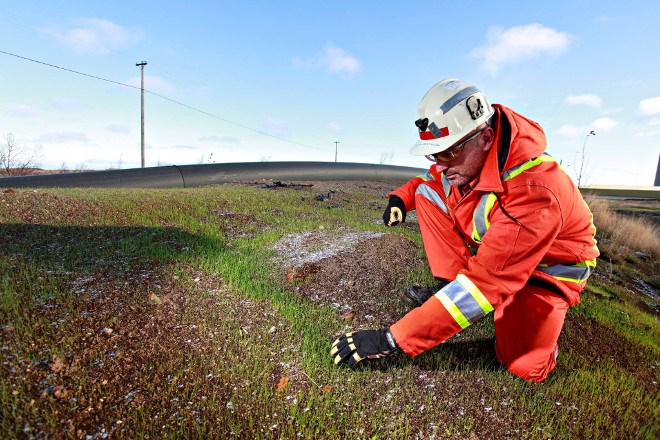Sudbury nickel miner Vale and an industrial waste management company have come up with an award-winning organic solution toward covering mine tailings near the smelter in Sudbury.
A remediation project conceived by Terrapure Organics Solutions, through a collaboration with the Brazilian mining giant, was lauded as the Project of the Year at the Environmental Leader & Energy Manager Conference in Denver, May 14.
This is the third consecutive year Burlington-headquartered Terrapure has been honoured with an Environmental Leader Award.
Terrapure has been working with Vale since 2012 on a program to apply municipally treated biosolids to reclaim and vegetate the mining company's Central Tailings area. This program was the first of kind in Ontario.
Tailings are the ore waste rock generated from mining.
For more than 100 years, Vale (formerly Inco) has been depositing tailings on the surface at its Copper Cliff impoundment site.
Today, there are some 1,300 hectares of tailings – deemed inactive – that still needs reclamation work.
While some spots had been successfully covered over the years, there remained large bare or sparsely vegetated patches that were susceptible to wind erosion.
To keep the dust down, Vale used farm equipment to lay down hay, straw and chemical suppressant. But it was a costly solution because it had to be done constantly to maintain the cover.
In search of a cheaper and more permanent fix, they entered into discussions with Terrapure Organics Solutions (formerly Terrapure Environment) to establish a trial project to apply municipally treated biosolids.
Getting the permits and approvals from the Ontario government took two years.
As a first-time trial, they had to work with the then-Ministry of Environment and Climate Change to come up with compliance standards.
With four test plots, they experimented with different amounts of biosolid coverage that, by the end of 2014, had successfully treated 25 hectares of tailings. Wildlife has noticeably started to return.
The City of Greater Sudbury contributed leaf and yard waste to the blend, allowing for the mixture to be odourless and providing a more diverse, nutrient-rich application.
To date, 175 hectares have been covered, thus applying more than 100,000 tonnes of biosolids that, otherwise, would have been diverted to a landfill.
The program is ongoing and Vale is scoping out other sites in Sudbury to do for this type of remediation.
“The program is new for the province, so we’re excited to see other mines follow Vale’s lead in identifying biosolids as an innovative, cost-effective reclamation option,” said Jeff Newman, director of business development at Terrapure Organics Solutions, in May 15 statement.
“This approach is a real win-win. It provides an off-season biosolids management alternative and Vale gets a highly effective tailings revegetation solution.”
“Biosolids are a new and innovative approach to tailings reclamation for the mining industry,” added Glen Watson, Vale’s superintendent of reclamation and decommissioning.
“We’ve had excellent plant growth yield under very challenging conditions where they have been applied in Vale’s Central Tailings Area. The success of this program is something we can all be proud of and learn from in the future.”




